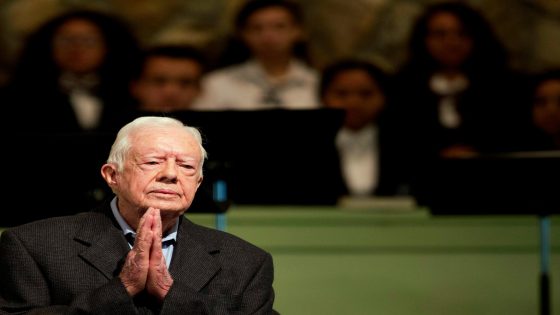Jimmy Carter, the 39th president of the United States who turned 100 this month, has built a legacy of courage and moral clarity over his many decades in public service, fighting tirelessly for peace and human dignity at home and around the world.
Now, as he nears the twilight of his life, we must take the time to reflect on one of his most courageous stances: his unwavering commitment to Palestinian dignity and self-determination.
In 1996, President Carter stood with us, the Palestinian people, as we voted for our leaders for the very first time. Though the Oslo peace process had failed to deliver the independent Palestinian state we had hoped for, Carter believed that the act of casting our ballots was still vital – that it was a chance to build a future rooted in peace and justice.
His presence in Palestine during that first election underscored our hopes for a brighter tomorrow, despite the heavy shadows of occupation and displacement.
In 2003, as the separation wall began to snake across the West Bank, I met President Carter once again at The Carter Center’s first-ever Human Rights Defenders Forum in Atlanta, Georgia.
There, I told him about the stark realities faced by Palestinians in the West Bank city of Qalqilia – 40,000 people encircled by concrete, with only one gate allowing them access to farms, medical care and the outside world. A single gate that opened and closed at the whim of Israeli soldiers, sometimes remaining shut for days at a time. As I updated him on the situation in Palestine, I called it what it is: apartheid, the separation of two peoples based on ethnicity, with one dominating the other through systemic injustice. Carter listened, intently and without judgement.
Just two years later, in 2005, he had the opportunity to see the reality for himself when he returned to Palestine to observe the presidential elections, in which I was the leading independent candidate against Fatah’s Mahmoud Abbas.
During this time, President Carter witnessed firsthand how Israel, rather than building bridges to secure peace, was constructing walls – walls that cut deep into Palestinian land, walls that annex settlements and water resources, walls that isolate Palestinians into enclaves. He also witnessed how, after a meeting we had in Jerusalem, the Israeli security service arrested me for no reason other than preventing me from talking to Palestinian voters there. It was during this visit, I believe, that it became clear to him that Israel was not preparing for peace, but instead consolidating control in ways that would make a two-state solution impossible.
In 2006, Carter published Palestine: Peace Not Apartheid, a book that shook the American political landscape. In it, he laid out a simple truth: without Palestinian freedom and dignity, there could be no peace. He made the case not as an enemy of Israel, but as someone deeply invested in its survival. Yet, for daring to speak this truth, Carter was vilified. He was accused of being anti-Semitic and ostracised by many in the US and even his Democratic Party. But Carter never wavered. He continued to speak the truth about the realities in Palestine – not out of malice for Israel, but from a deep belief in justice.
He understood that the only way Israel could truly thrive was through a just peace with the Palestinians. He recognised that the Palestinian people, who have lived under brutal occupation since 1967 and experienced repeated displacement since 1948, were entitled to the same rights and dignity as anyone else. He recognised in later writings that it was my 2003 account of the situation in Qalqilia that made him understand the reality of apartheid in Palestine.
What makes Jimmy Carter’s stance on Palestine unique is not only his moral courage, but the fact that he was once the most powerful man in the world. As US president, he tried to open the road to lasting peace. He could not secure Palestinian self-determination during his one-term presidency between 1977 and 1981, yet he refused to stop trying. In the decades since leaving office, he has turned every stone, searched for every possibility to bring about a just peace for Palestinians and all the people of the Middle East.
Now, as he enters his 100th year and tributes pour in to honour his many humanitarian achievements, we must not forget that he was one of the most important truth-tellers of our time. Carter was willing to see the brutality inflicted on the Palestinian people and refused to remain silent about it. That is a rare kind of courage, especially for a former US president, that should be recognised and remembered.
The best way we can honour Jimmy Carter, his bravery and unwavering moral clarity is to carry forward his commitment to equal human rights for all people.
The Palestinian struggle for self-determination is not just a political issue – it is a moral one. As Carter always emphasised, the US has a special responsibility. Without American political and military support, Israel would not have been able to continue its ruthless occupation and apartheid against Palestinians or to commit the genocide in Gaza.
As we celebrate and reflect on Carter’s life and legacy, let us amplify his call for the US to be a genuine force for peace and justice around the world. Let us recognise, as Carter wanted, that peace in our Holy Land will only come when the rights and dignity of Palestinians are acknowledged and respected. Only then will we truly be able to honour his legacy and the values he stood for so bravely.
The views expressed in this article are the author’s own and do not necessarily reflect Al Jazeera’s editorial stance.





